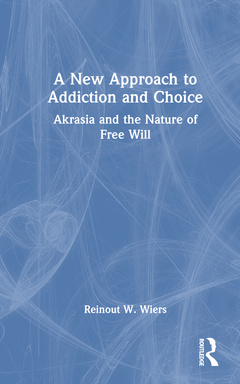Description
A New Approach to Addiction and Choice
Akrasia and the Nature of Free Will
Author: Wiers Reinout W.
Language: English
Subjects for A New Approach to Addiction and Choice:
· 13.8x21.6 cm · Hardback
Description
/li>Contents
/li>Biography
/li>
This engaging book provides a novel examination of the nature of addiction, suggesting that by exploring akrasia, the act of acting against one?s better judgement, we can better understand our addictive behaviours. It offers an alternative to the dominant biomedical model of addiction as a chronic brain disease by looking at the nature of how we make decisions and proposing the idea that biased choice is central to addiction.
The book looks at both classic substance use disorders and newer "addictions" to smartphones, meat and fossil fuels. It discusses current perspectives on free will in philosophy, psychology and neuroscience, and the questions surrounding free will vs. determinism, including our ability to steer our behaviours guided by the promise of future outcomes. Different perspectives on addiction and choice are presented in an eloquent style, and illustrated by personal stories.
Through a lively discussion of the key scientific and philosophical issues surrounding addiction, this book is valuable for students in psychology, criminology, sociology and social work, as well as health care professionals and general readers interested in the nature of our free will.
1. Introduction. 2. Akrasia, free will and addiction. 3. Addiction: a chronic brain disease. 4. Why addiction is (usually) not a chronic brain disease. 5. Addiction as biased choice. 6. Development, vulnerability and prevention. 7. Pills or talk-therapy?. 8. Improving choice: reward alternatives, cognitive training and mindfulness. 9. Meat addiction? Cell phones, fossil fuels and our future. 10. Conclusions and lessons. Index.
Reinout W. Wiers is Professor of Developmental Psychopathology, at the University of Amsterdam, where he leads the Addiction Development and Psychopathology (ADAPT) Lab and he is (co)director of the University of Amsterdam’s interdisciplinary Centre for Urban Mental Health. He is internationally known for his work on assessing and changing implicit cognitive processes in addiction. In addition to his primary work as researcher, he has been trained as a cognitive behavior therapist.




